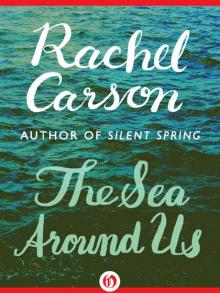- Home
- Rachel Carson
Under the Sea Wind Page 6
Under the Sea Wind Read online
Page 6
A shadow took form on the green screen beneath the osprey and the surface dimpled as a fish nosed at the film. In the sound two hundred feet below the fish hawk, Mugil, the mullet—the leaper—gathered his strength and flung himself in exhilaration into the air. As he was flexing his muscles for the third leap a dark form fell out of the sky and viselike talons seized him. The mullet weighed more than a pound, but Pandion carried him easily in his taloned feet, bearing the fish across the sound and to the nest three miles away.
Flying up the river from the estuary the osprey carried the mullet head first in his talons. As he neared the nest he relaxed his grip with the left foot and, checking flight, alighted on the outer branches of the nest with the fish still gripped in his right foot. Pandion lingered over his meal of fish for more than an hour, and when his mate came near he crouched low over the mullet and hissed at her. Now that the nesting was done, every bird must fish for itself.
Later in the day, as he returned down the river to fish, Pandion swooped low to the water and for the space of a dozen wing beats dragged his feet in the river, cleansing them of the adhering fish slime.
On his return Pandion was watched by the sharp eyes of a large brown bird perched in one of the pines on the west bank of the river, overlooking the marshes of the estuary. White Tip, the bald eagle, lived as a pirate, never fishing for himself when he could steal from the ospreys of the surrounding country. When Pandion moved out over the sound the eagle followed, mounting into the air and taking up a position far above the fish hawk.
For an hour two dark forms circled in the sky. Then from his high station White Tip saw the body of the osprey suddenly dwindle to sparrow size as he fell in a straight drop, saw the white spray mount from the water as the fish hawk disappeared. After the passing of thirty seconds Pandion emerged from the water, mounting straight for fifty feet with short, heavy wing beats and then leveling out into straight flight toward the river’s mouth.
Watching him, White Tip knew that the osprey had caught a fish and was taking it home to the nest in the pines. With a shrill scream that fell down through the sky to the ears of the osprey, the eagle whirled in pursuit, keeping his elevation of a thousand feet above the fish hawk.
Pandion cried out in annoyance and alarm, redoubling the force of his wing beats in an effort to reach the cover of the pines before his tormentor should attack. The speed of the hawk was retarded by the weight of the catfish that he carried and by the convulsive struggles of the fish, held firmly in the strong talons.
Between the island and the mainland and several minutes’ flight from the mouth of the river the eagle gained a position directly over the hawk. On half-closed wings he dropped with terrific speed. The wind whined through his feathers. As he passed the osprey he whirled in air, back to the water, presenting his talons to the attack. Pandion dodged and twisted, eluding the eight curved scimitars. Before White Tip could recover himself Pandion had shot aloft two hundred, five hundred feet. The eagle hurtled after him, mounted above him. But even as he began the stoop, the fish hawk, in another upward soaring, surmounted the position of his enemy.
Meanwhile the fish, drained of life by separation from the water, grew limp as all its struggles ceased. Like a mist gathering on a clear glass surface, a film clouded its eyes. Soon the iridescent greens and golds that made its body, in life, a thing of beauty had faded to dullness.
By turns rising and swooping, hawk and eagle rose to a great height, into the empty places of the air, of which the sound and its shoals and white sands had no part.
Cheep! Cheep! Chezeek! Chezeek! screamed Pandion in a frenzy of excitement.
A dozen white feathers, ripped from his breast as he barely evaded White Tip’s talons on the last stoop, fluttered earthward. Of a sudden the osprey bent his wings sharply and dropped like a stone toward the water. The wind roared in his ears, half blinded him, plucked at his feathers as the sound rushed up to meet him. It was his final effort to outwit a stronger and more enduring enemy. But from above, the relentless dark form fell even faster than Pandion, gained on him, passed him as the fishing boats on the sound grew big as gulls afloat, whirled and tore the fish from his grasp. The eagle carried the fish to his pine-tree perch to rend it, muscle from bone. By the time he reached the perch Pandion was beating out heavily over the inlet to new fishing grounds at sea.
5
Winds Blowing Seaward
THE NEXT MORNING the north wind was tearing the crests off the waves as they came over the inlet bar, so that each was trailing a heavy smoke of spray. Mullet were jumping in the channel, excited by the change in the wind. In the shallow river estuary and over the many shoals of the sound, the fish sensed the sudden chill that passed to the water from the air moving over it. The mullet began to seek the deeper waters which held the stored warmth of the sun. Now from all parts of the sound they were assembling in large schools that moved toward the channels of the sound. The channels led to the inlet, and the inlet was the gateway to the open sea.
The wind blew from the north. It blew down the river, and the fish moved before it to the estuary. It blew across the sound to the inlet, and the fish ran before it to the sea.
The ebbing tide carried the mullet through the deeper green glooms and over the white sandy bottom of the channel, scoured clean of living things by the strong currents that raced through it each day, twice running seaward, twice landward. Above them, as they moved, the surface of the water was broken into a thousand glittering facets that shone with the sun’s gold. One after another the mullet rose to the shimmering ceiling of the sound. One after another they flexed their bodies in a quickening rhythm, gathering their strength and leaping into the air.
Going out with the tide the mullet passed a long, narrow sandspit called Herring Gull Shoal, where a wall of massive stone was built along the channel to prevent the washing in of the loose sand. Green, turgid fronds of seaweed were anchored by their holdfasts to the stones, which were crusted whitely with barnacles and oysters. From the shadow of one of the stones of the breakwater a pair of small, malignant eyes watched the mullet as they passed seaward. The eyes belonged to the fifteen-pound conger eel who lived among the rocks. The thick-bodied conger preyed on the schools of fish that roved down along the dark wall of the breakwater, hurling itself out of its gloomy cavern to seize them in its jaws.
In the upper layer of water, a dozen feet above the swimming mullet, schools of silversides quivered in formation, each fishlet a gleaming mote reflecting the sunlight. From time to time scores of them leaped out of the water, bursting through the surface film of the fish’s world and falling back again like raindrops— first denting, then piercing the tough skin between air and water.
Past a dozen sandspits of the sound, each with its little colony of resting gulls, the tide took the mullet. On an old shell rock which the sea was in process of turning into an island by dropping silt and sand among the shells and by bringing, on its ebb tides, the seeds of marsh grasses to bind the soil, two gulls were hunting busily for sunray clams, which lay half buried in the wet sand. Finding them, the gulls chipped away at the heavy, vitreous shells, rayed with bands of fawn color and lilac. After much work with their strong bills the gulls were able to crack the shells and eat the soft clam bodies within.
On the mullet went, past the big inlet buoy that was leaning toward the sea with the press of the tide. Its iron bulk rose and fell with the water, even as the music of its iron throat changed pitch and tempo with the changing rhythms of the sea. The inlet buoy was a cosmos unto itself, rolling in the waters of the sound. Ebb tide and flood tide were of its own making, coming alternately as the buoy lifted to the passing of a wave and rolled in its trough.
The buoy had not been taken in for scraping and repainting since the previous spring, and it was thickly crusted with the shells of barnacles and mussels and with saclike sea squirts and the soft moss patches of the bryozoa. Deposits of sand and silt and green threads of algae had lodged in the many crevi
ces between the shells and among the rootlike attachments of the dense mat of animals. Over and among this thick, living growth, slender-bodied animals called amphipods, in jointed armor, clambered in and out in endless search of food; starfish crept over the oysters and mussels and preyed upon them, gripping the shells with the sucking discs of their strong arms and forcing them open. Among the shells the flowerlets of the sea anemones opened and closed, spreading fleshy tentacles to seize food from the water. Most of the twenty or more kinds of sea animals that lived on the buoy had come to it months before, during the season when the waters of the sound and inlet swarmed with larvae. Many of these myriad beings, as transparent as glass and more fragile, were doomed to die in infancy unless they found a solid place of attachment. Those that chanced upon the great bulk of the buoy in the sound attached themselves by cementing fluids from their own bodies or by byssus thread or holdfast. There they would remain throughout life, a part of the swaying world, rolling in watery space.
Within the inlet the channel widened and the pale-green water grew murky with the wave scourings of loose sand. On the mullet went. The mutter and rumble of the surf grew. With their sensitive flanks the fish perceived the heavy jar and thud of sea vibrations. The changing pulse of the sea was caused by the long inlet bar, where the water foamed to a white froth as the waves spilled over it. Now the mullet passed out through the channel and felt the longer rhythms of the sea—the rise, the sudden lift and fall of waves come from the deep Atlantic. Just outside the first surf line the mullet leaped in these larger swells of ocean. One after another swam upward to the surface and jumped into the air, falling back with a white splash to resume its place in the moving school.
The lookout who stood on a high dune above the inlet saw the first of the mullet running out of the sound. With practiced eye, he estimated the size and speed of the school from the spurts of spray when the mullet jumped. Although three boats with their crews were waiting farther down the ocean beach, he gave no signal at the passing of the first mullet. The tide was still on the ebb; the pull of the water was seaward and the nets could not be drawn against it.
The dunes are a place of high winds and driven sand, of salt spray and sun. Now the wind is from the north. In the hollows of the dunes the beach grasses lean in the wind and with their pointed tips write endless circles in the sand. From the barrier beach the wind is picking up the loose sand and carrying it seaward in a haze of white. From a distance the air above the banks looks murky, as though a light mist is rising from the ground.
The fishermen on the banks do not see the sand haze; they feel its sting in eyes and face; they feel it as it sifts into their hair and through their clothing. They take out their handkerchiefs and tie them across their faces, and they pull long-visored caps low on their heads. A wind from the north means sand in your face and rough seas under your boat keel, but it means mullet, too.
The sun is hot as it beats down on the men standing on the beach. Some of the women and children are there, too, to help their men with the ropes. The children are bare-footed, wading in the pools left in the scoured-out depressions of the beach, ribbed with sand waves.
The tide has turned, and now one of the boats is shot out between the breakers to be ready for the fish when they come. It’s not easy, launching a boat in this surf. The men leap to their places like parts of a machine. The boat rights itself, wallows into the green swells. Just outside the surf line the men wait at the oars. The captain stands in the bow, arms folded, leg muscles flexing to the rise and fall of the boat, his eyes on the water, looking toward the inlet.
Somewhere in that green water there are fish— hundreds of fish—thousands of fish. Soon they will come within reach of the nets. The north wind’s blowing, and the mullet are running before it out of the sound, running down along the coast, as mullet have done for thousands upon thousands of years.
Half a dozen gulls are mewing above the water. That means the mullet are coming. The gulls don’t want the mullet; they want the minnows that are milling about in alarm as the larger fish move through the shallows. The mullet are coming down just outside the breakers, traveling about as fast as a man could walk on the beach. The lookout has marked the school. He walks toward the boat, keeping opposite the fish, signaling their course to the crew by waving his arms.
The men brace their feet against the thwarts of the boat and strain to the oars, pulling the boat in a wide semicircle to the shore. The net of heavy twine spills silently and steadily into the water over the stern and cork floats bob in the water in the wake of the boat. Ropes from one end of the net are held by half a dozen men on shore.
There are mullet in the water all around the boat. They cut the surface with their back fins; they leap and fall. The men lean harder to the oars, pulling for the shore to close the net before the school can escape. Once in the last line of surf and in water not more than waist-deep, the men jump into the water. The boat is seized by willing hands and is dragged out on the beach.
The shallow water in which the mullet are swimming is a pale, translucent green, murky with the loose sand which the waves are stirring up. The mullet are excited by their return to the sea with its bitter salt waters. Under the powerful drive of instinct they move together in the first lap of a journey that will take them far from the coastal shallows, into the blue haze of the sea’s beginnings.
A shadow looms in the green, sun-filled water in the path of the mullet. From a dim, gray curtain the shadow resolves itself into a web of slender, crisscross bars. The first of the mullet strike the net, back water with their fins, hesitate. Other fish are crowding up from behind, nosing at the net. As the first waves of panic pass from fish to fish they dash shoreward, seeking a way of escape. The ropes held by fishermen on the shore have been drawn in so that the netting wall extends into water too shallow for a fish to swim. They run seaward, but meet the circle of the net that is growing smaller, foot by foot, as the men on shore and in water up to their knees brace themselves in the sliding sand and pull on the ropes—pull against the weight of water—against the strength of the fish.
As the net is closed and gradually drawn in to shore, the press of fish in the seine becomes greater. Milling in frantic efforts to find a way of escape, the mullet drive with all their combined strength of thousands of pounds against the seaward arc of the net. Their weight and the outward thrust of their bodies lift the net clear of the bottom, and the mullet scrape bellies on the sand as they slip under the net and race into deep water. The fishermen, sensitive to every movement of the net, feel the lift and know they are losing fish. They strain the harder, till muscles crack and backs ache. Half a dozen men plunge out into water chin-deep, fighting the surf to tread the lead line and hold the net on the bottom. But the outer circle of cork floats is still half a dozen boat lengths away.
Of a sudden the whole school surges upward. In a turmoil of flying spray and splashing water mullet by the hundred leap over the cork line. They pelt against the fishermen, who turn their backs to the fish raining about them. The men strive desperately to lift the cork line above the water so that the fish will fall back into the circle when they strike the net.
Two piles of slack netting are growing on the beach, the heads of many small fishes no longer than a man’s hand caught in the meshes. Now the ropes attached to the lead lines are drawn in faster and the net takes on the shape of a huge, elongated bag, bulging with fish. As the bag is drawn at last into the shallow fringe of the surf the air crackles with a sound like the clapping of hands as a thousand head of mullet, with all the fury of their last strength, flap on the wet sand.
The fishermen work quickly to take the mullet from the net and toss them into the waiting boats. By a dexterous shake of the net, they toss on the beach the small fish that are gilled in the seine. There are young sea trout and pompano, mullet of the last year’s spawning, young ceros and sheepshead and sea bass.
Soon the bodies of the young fish—too small to sell, too small to eat�
�litter the beach above the water line, the life oozing from them for want of means to cross a few yards of dry sand and return to the sea. Some of the small bodies the sea would take away later; others it would lay up carefully beyond reach of the tides among the litter of sticks and seaweeds, of shells and sea-oats stubbles. Thus the sea unfailingly provides for the hunters of the tide lines.
After the fishermen had made two more hauls and then, as the tide neared the full, had gone away with laden boats, a flock of gulls came in from the outer shoals, white against the graying sea, and feasted on the fish. As the gulls bickered among themselves over the food, two smaller birds in sleek, black plumage walked warily among them, dragging fish up on the higher beach to devour them. They were fish crows, who took their living from the edge of the water, where they found dead crabs and shrimps and other sea refuse. After sundown the ghost crabs would come in legions out of their holes to swarm over the tide litter, clearing away the last traces of the fish. Already the sand hoppers had gathered and were busy at their work of reclaiming to life in their own beings the material of the fishes’ bodies. For in the sea, nothing is lost. One dies, another lives, as the precious elements of life are passed on and on in endless chains.
All through the night, as the lights in the fishing village went out one by one and fishermen gathered around their stoves because of the chill north wind, mullet were passing unmolested through the inlet and running westward and southward along the coast, through black water on which the wave crests were like giant fish’s wakes, silver in the light of the moon.

 Silent Spring
Silent Spring Under the Sea Wind
Under the Sea Wind The Edge of the Sea
The Edge of the Sea The Sea Around Us
The Sea Around Us Lost Woods: The Discovered Writing of Rachel Carson
Lost Woods: The Discovered Writing of Rachel Carson Lost Woods
Lost Woods